Workshops
The Bachelor of Arts (Fine Art) has a two stage enrolment process in 2021. In stage one, you will enrol via Enrolment Online into our courses for semesters one and two. Please check stage one is complete before proceeding. In stage two, you will select your semester 2 classes for Workshop and ART: History+Theory+Cultures via a preferencing process system.
This page will assist you with stage two of the enrolment process. Here you will find a list of potential semester 2 Workshop classes. (Note: There is a separate page for Fine Art Studio classes and a separate page for ART: History+Theory+Cultures classes.)
You will only take one Workshop class in semester 2, but you need to list two (2) preferences. These workshops will be for both first and second year students and will be offered under the following course codes:
Workshop 2 VART 3650 (1st year students)
Workshop 4 VART 3652 (2nd year students)
These are the course codes you enrolled into in stage one of the process.
Read the list below carefully and select two (2) Workshop classes you would be happy to take. The 2021 preferencing process will be communicated to you by email at a later date. Remember, these Workshop classes are 12 credit point courses and will require 3 contact hours per week plus associated learner directed hours.
Please find link to the course guide VART3650 or VART3652.
Please find the ballot forms here:
Workshops
Balloting closes at 4pm (AEST) on Friday 4th June.
The ballot is NOT based on a ‘first in best dressed’ process – you have until the closing time to submit the form, which you can only submit ONCE. If you miss the preferencing deadline (Friday 4th June), you will be able to allocate (or re-allocate) yourself to a class when myTimetable opens for allocation/adjustment between 7th July and 26th July, subject to availability.
Late preferences will not be possible - do not ask to be allocated manually.
IMPORTANT PLEASE NOTE: You must not repeat any class in your preference lists. Every effort will be made to place you in your first preference classes. Although we would like to offer all of the Workshop options below, classes are subject to viability and may not run if numbers are too low.
Course Information
Offering Studio & Studio Lead
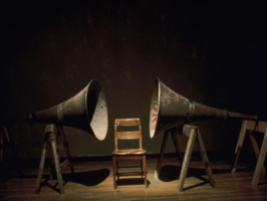
Janet Cardiff and George Bures Miller Dark Pool, 1995.
Art & Sound
What is sound? How do we feel and sense it? And in what ways can we creatively work with it in our visual arts practice?
In this course we will listen for answers in the different kinds of sonic practice used in visual art, performance and installation. We will experiment with sound and make sound works using our voice, found instruments together with field recordings, microphones and speakers that are available for loan. We will start to unpack various approaches to composition, sound design, performance, site responsive practices, and most importantly the practice of listening.
Whether you’re into sound already or have no idea at all about its possibilities, this course is for you!
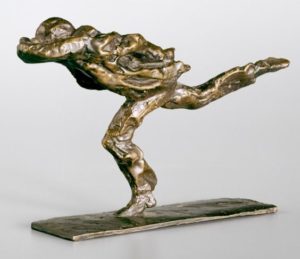
RICK AMOR RUNNING MAN, 1989, NGV COLLECTION Margaret Stewart Endowment, 1991
© Rick Amor/Licensed by Copyright Agency, Australia
Bronze Foundry
In this course you will develop practical skills across a range of processes and materials commonly used in sculptural practice in the bronze foundry. You will be introduced to methods and materials involved in lost wax casting in order to make small bronze works. This method involves the completion of a series of steps from wax modelling, plaster and sand investments, melting and pouring bronze, finishing and patination. You will undertake these steps in sequence and as a group and this will require hands-on attendance at all classes. The course is mainly practical but with appropriate tutorial presentations covering theoretical and relevant historical background.
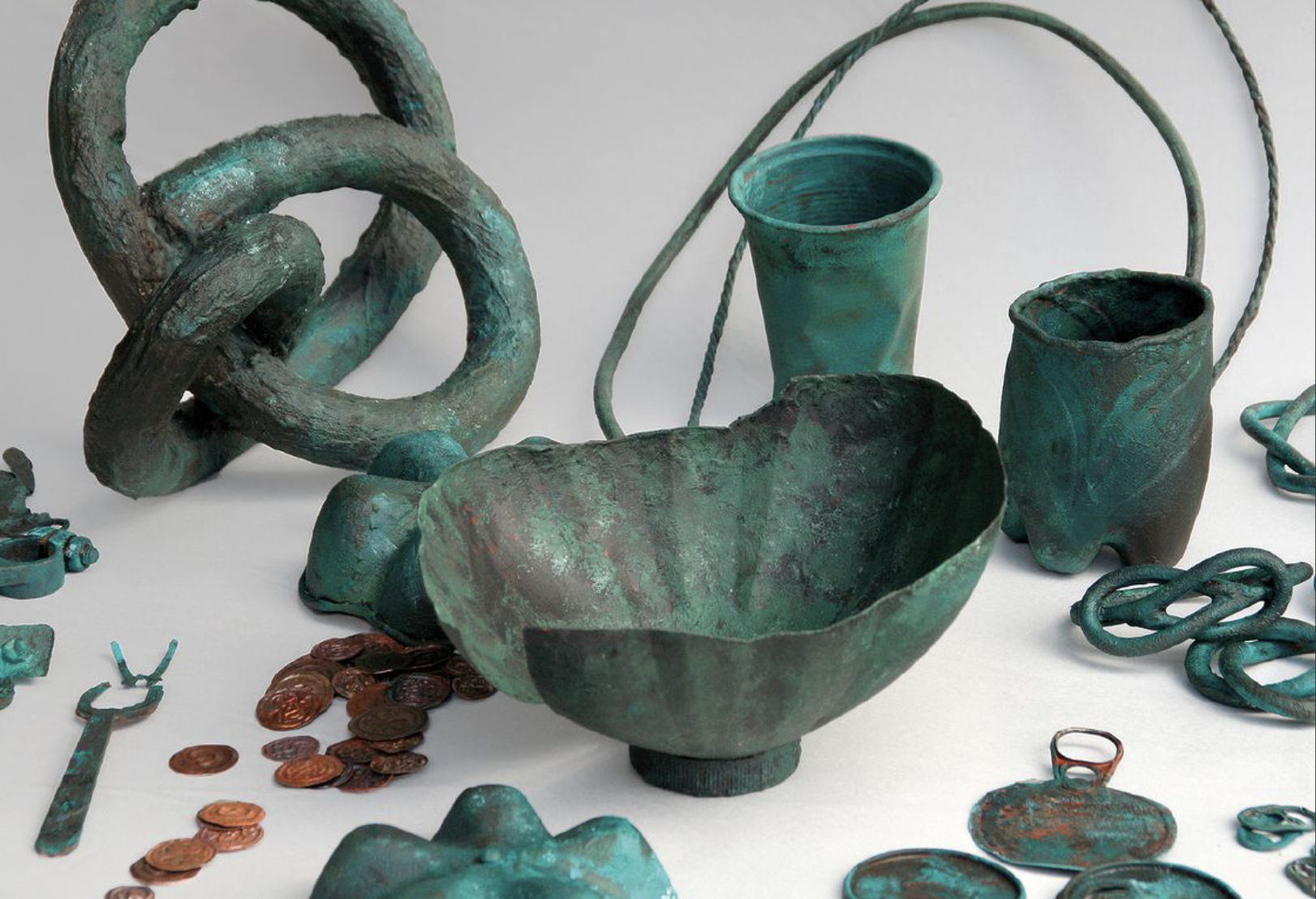
Peter Bauhuis’ Treasure of Kolomna, supposedly from Russia, ca. 600 AD; Bronze, copper
Casting and Metal Alloying
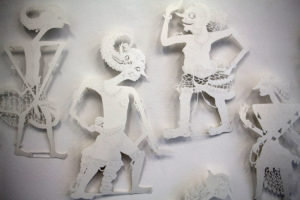
Image Credit: Sangeeta Sandrasegar, ART-at-Berlin---Courtesy-of-Michael-Reid Gallery
Drawing Cultures
In this course you will be introduced to local and global ideas examining intersections of visual cultures and drawing practices. Linking theory to practice this course will develop your formal and conceptual understanding of drawing from the personal to the digital. You will be encouraged to reflect on this as a primary point of investigation within international contemporary art practices. The objectives of this course are to understand how knowledge and making are linked through ways of seeing and thinking, to investigate pictorial languages and approaches to communication through the making of creative works, and, to relate critical concepts, texts and practices to your studio production.
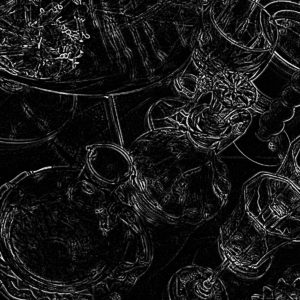
Irene Barberis, charcoal on paper (detail)
Drawing & Perception
In this course offers you will be provided a structured drawing program in all facets; techniques, refinement of general drawing skills, approaches to seeing, thinking and perception. It encompasses life drawing and general drawing including aspects of the figure, perspective, pictorial composition and the investigation of self and personal vision. You will produce a folio of resolved drawings with a support folio of studies and research material that are relevant to a range of areas of study. You will examine formal conventions of drawing, historical contexts and its capacity to communicate expressively across a range of media.

Wall, 2019 - photograph - Phil Edwards
Looking For Abstraction In The World Around You
"
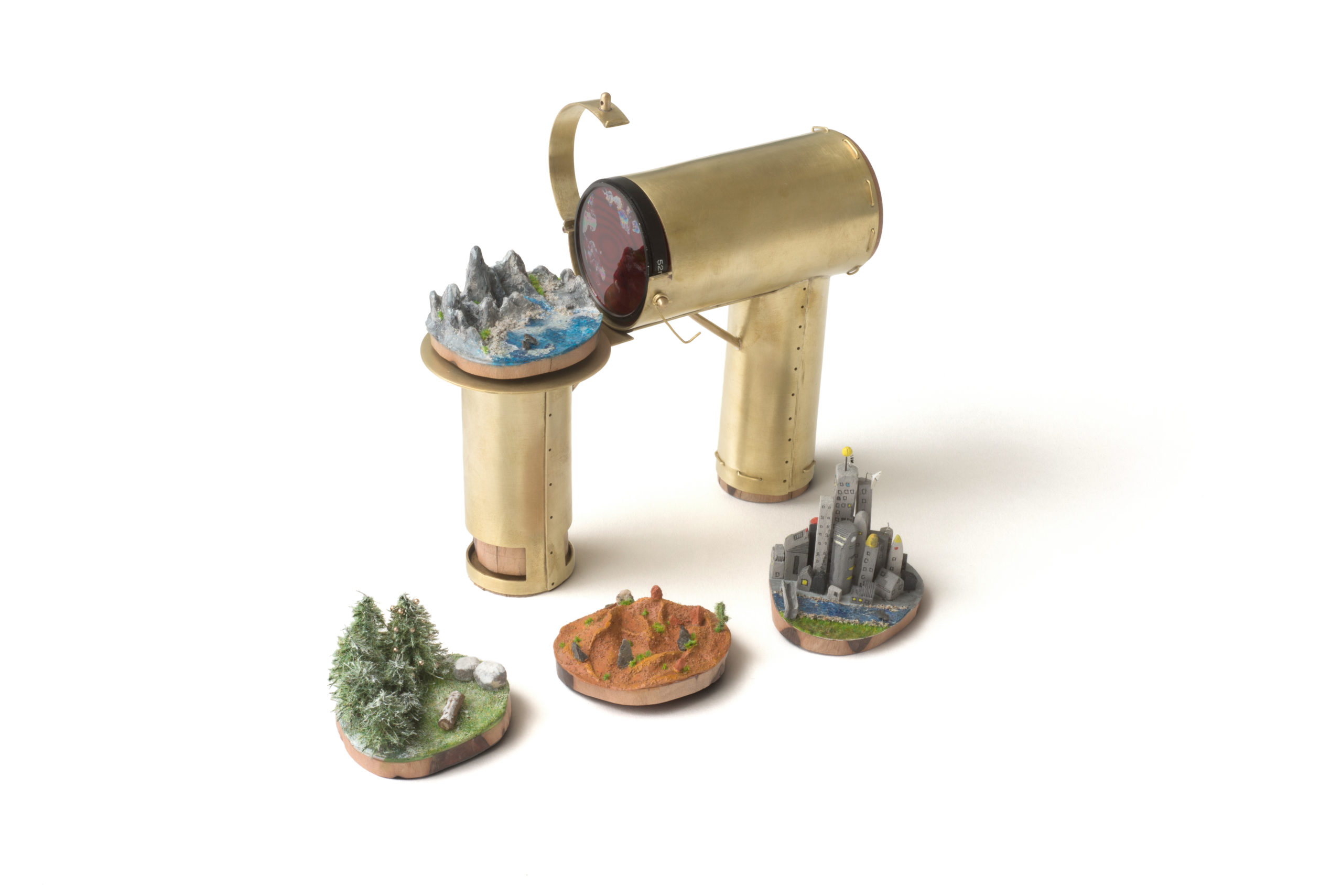
Hope Raynes, Aspectus, 2019.
Hand held eye piece and miniature worlds. Brass, wood, paint, camera lenses, mixed materials (worlds).
Object Miniatures
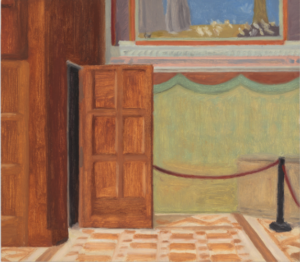
Eleanor Ray, Assisi (Saint Francis and the birds) 2016, oil on panel 6 x 7 inches
Painting Ideas & Methodologies
In this advanced painting workshop, you will gain knowledge and experience in established and experimental painting techniques, skills and concepts. You will experience a wide range of materials and production processes to create artworks relating to painting with an emphasis on experimentation, conceptual development and studio research. The course is structured through demonstrations & technical experimentation followed by generalised thematic projects and advanced individual self-directed projects. The technical experiments enable you to produce works that complement your own studio practice. Ideas include: the preparation and use of supports and grounds for a variety of painting methods including oil, acrylic and water colour, working from observation, colour and grisaille, tonal painting, the contemporary portrait and still-life, under-painting and glazing. Major contemporary themes include the relationship of painting to photography, hybrid painting, painting deconstruction and painting and materiality. Individual and group tutorials, discussion and feedback sessions, studio demonstrations and studio health and safety complement this painting workshop
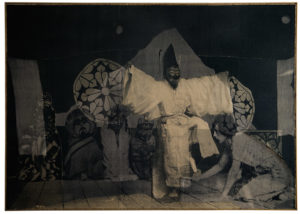
DAVID NOONAN, TWO MOONS, Screen print on linen, 2009-10
Photographic Screen Printing
This course will introduce you to screen-printing processes and technologies that focus on photographic and text based printing. The objectives of the course are to provide you with the skills and knowledge to: produce photographic screen-prints; reflect upon the role of photographic screen-printing in contemporary art; and expand the aesthetic and conceptual possibilities of your art practice.
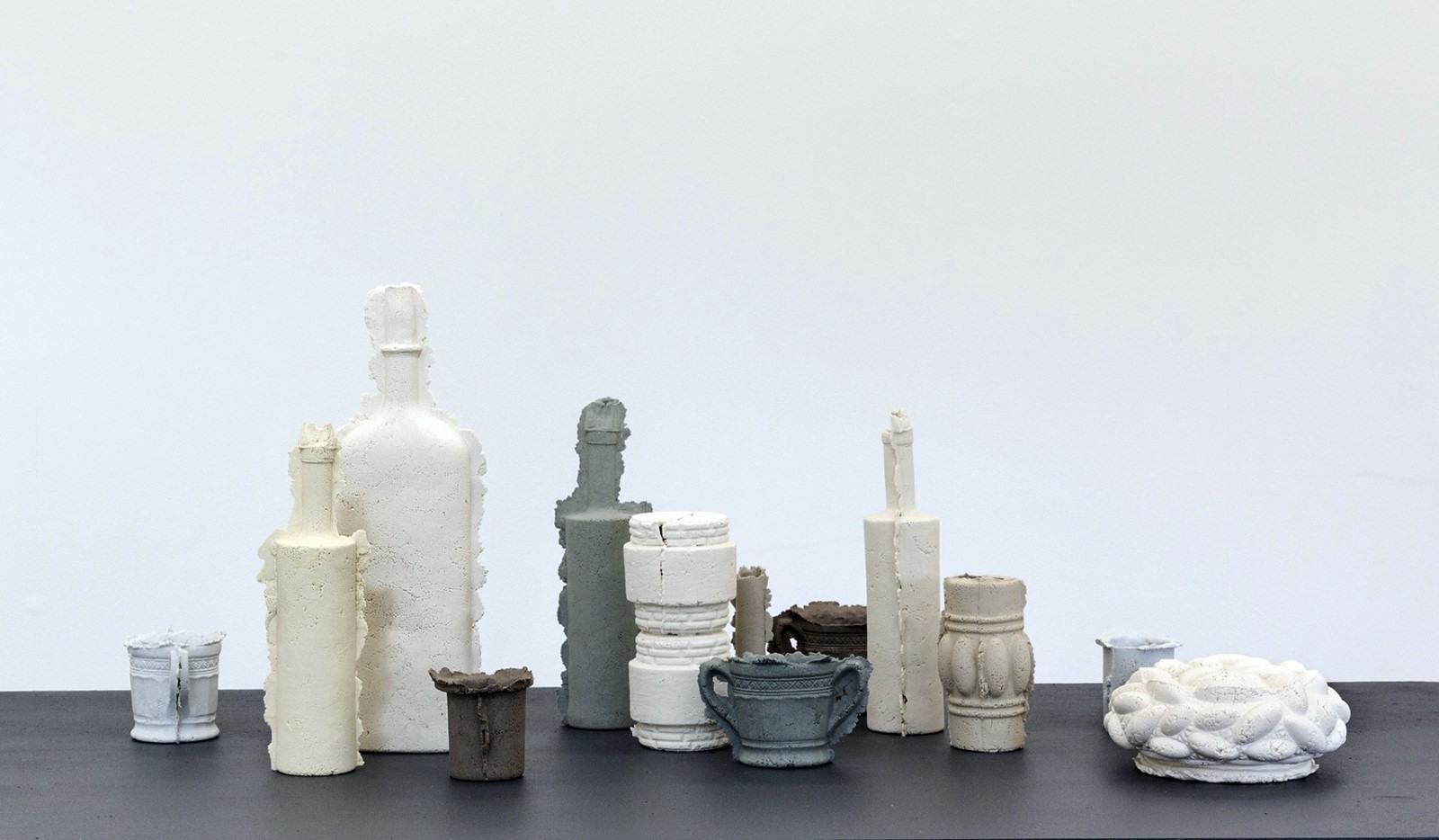
Kristin Burgham, Porcelain Photographer: Janelle Low 2020
Plaster Moulds & Ceramic Multiples
In this course you will develop moulding skills and explore the mould as a basis of experimental alteration in order to develop and evolve unique objects. Conceptual, perceptual, formal and aesthetic concerns will be addressed as they relate to object making and assist you to develop an individual approach to ceramic object forming using moulding processes.
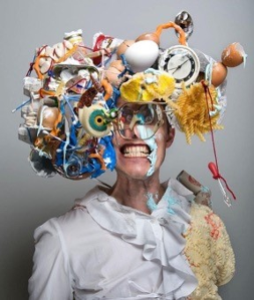
John Bock, FischGrätenMelkStand, 2010
Pop Trash & Remix
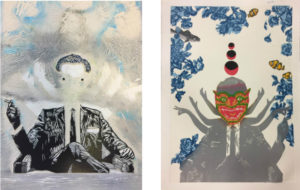
Bow Vacharussiriyuth, reduction linocut in progress, 2016
Print (Re)Generations
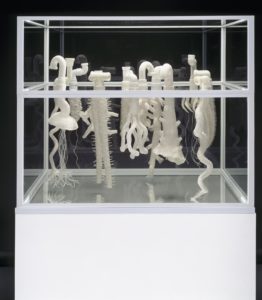
Fiona Hall "Dead in the Water" 1999
National Gallery of Victoria, Melbourne. Purchased, 1999
© Courtesy of the artist
Soft Sculpture
This course focuses on the possibilities of making soft sculpture within a contemporary art framework. Students will undertake a series of short workshops which introduce a variety of conceptual and technical skills including basic pattern making, working with scale, hand and machine sewing, armature construction and the use of ready-mades. These skills will be contextualised by the works of a range of artists from Louise Bourgeois and Yayoi Kusama to Australian artists Brooke Andrew and Kate Just. Students will develop their own works using a range of pliable materials and are expected to develop new experimental approaches and definitions in the production of soft sculpture.

Image Credit: Leanne Marshall. Photographer: Te’ Claire.
The Glazed Surface
Clay is an irresistible material with endless making potential. This subject is a playful and explorative approach to clay in its many forms: liquid, plastic, hard and fired. Students will be guided through series of projects asking the material: What if? This subject has the potential of creating alternative or unimagined outcomes.